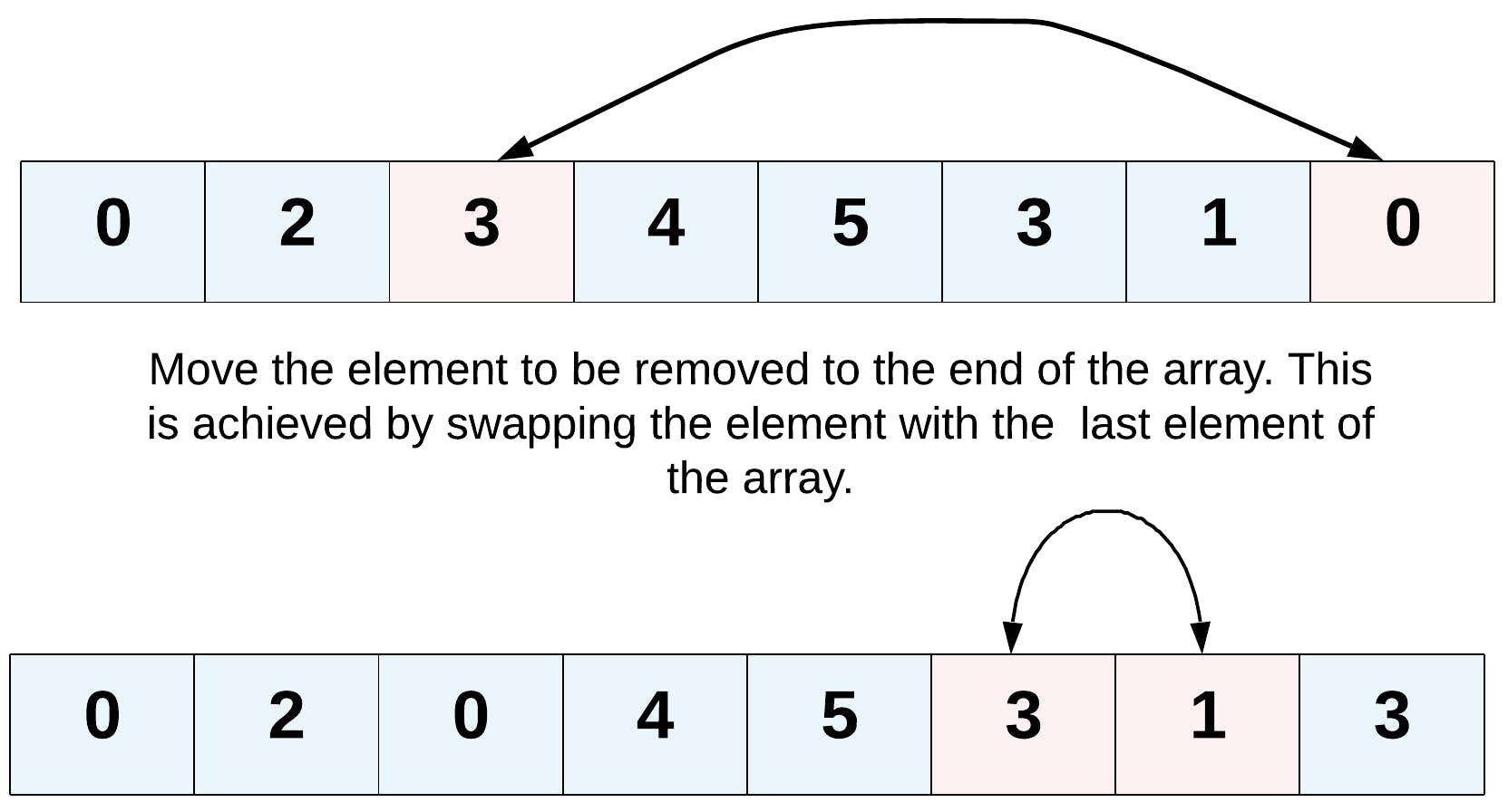27. Remove Element
題目敘述
Given an integer array nums and an integer val, remove all occurrences of val in nums in-place. The relative order of the elements may be changed.
Since it is impossible to change the length of the array in some languages, you must instead have the result be placed in the first part of the array nums. More formally, if there are k elements after removing the duplicates, then the first k elements of nums should hold the final result. It does not matter what you leave beyond the first k elements.
Return k after placing the final result in the first k slots of nums.
Do not allocate extra space for another array. You must do this by modifying the input array in-place with O(1) extra memory.
Custom Judge:
The judge will test your solution with the following code:
int[] nums = [...]; // Input array
int val = ...; // Value to remove
int[] expectedNums = [...]; // The expected answer with correct length.
// It is sorted with no values equaling val.
int k = removeElement(nums, val); // Calls your implementation
assert k == expectedNums.length;
sort(nums, 0, k); // Sort the first k elements of nums
for (int i = 0; i < actualLength; i++) {
assert nums[i] == expectedNums[i];
}
If all assertions pass, then your solution will be accepted.
Example 1:
Input: nums = [3,2,2,3], val = 3
Output: 2, nums = [2,2,_,_]
Explanation: Your function should return k = 2, with the first two elements of nums being 2.
It does not matter what you leave beyond the returned k (hence they are underscores).
Example 2:
Input: nums = [0,1,2,2,3,0,4,2], val = 2
Output: 5, nums = [0,1,4,0,3,_,_,_]
Explanation: Your function should return k = 5, with the first five elements of nums containing 0, 0, 1, 3, and 4.
Note that the five elements can be returned in any order.
It does not matter what you leave beyond the returned k (hence they are underscores).
Constraints:
0 <= nums.length <= 1000 <= nums[i] <= 500 <= val <= 100
Hint 1:
The problem statement clearly asks us to modify the array in-place and it also says that the element beyond the new length of the array can be anything. Given an element, we need to remove all the occurrences of it from the array. We don't technically need to remove that element per-say, right?
Hint 2:

We can move all the occurrences of this element to the end of the array. Use two pointers!
Hint 3:
Yet another direction of thought is to consider the elements to be removed as non-existent. In a single pass, if we keep copying the visible elements in-place, that should also solve this problem for us.
題目翻譯
給定一個整數陣列 nums 和一個 val,從 nums 中剔除掉相等於 val 的值。其中不能使用複製 nums,需要直接修改陣列的元素。並且回傳從第幾個索引之後就沒有值了。
解法解析
這題使用 Two pointers 的方式來解,但有兩種不同的寫法。第二種寫法在當刪除的元素比較少時,有比較好的效率,因為會將元素往前提,加快掃描的速度。
解法範例
Go
func removeElement(nums []int, val int) int {
i := 0
for _, v := range nums {
if v != val {
nums[i] = v
i++
}
}
return i
}
func removeElement(nums []int, val int) int {
n := len(nums)
i := 0
for i < n {
if nums[i] == val {
nums[i] = nums[n-1]
n--
} else {
i++
}
}
return n
}
JavaScript
/**
* @param {number[]} nums
* @param {number} val
* @return {number}
*/
var removeElement = function (nums, val) {
let i = 0;
for (const j of nums) {
if (j !== val) {
nums[i] = j;
i++;
}
}
return i;
};
/**
* @param {number[]} nums
* @param {number} val
* @return {number}
*/
var removeElement = function (nums, val) {
let n = nums.length;
let i = 0;
while (i < n) {
if (nums[i] === val) {
nums[i] = nums[n - 1];
n--;
} else {
i++;
}
}
return n;
};
Kotlin
class Solution {
fun removeElement(nums: IntArray, `val`: Int): Int {
var i = 0
for (j in 0 until nums.size) {
if (nums[j] != `val`) {
nums[i] = nums[j]
i++
}
}
return i
}
}
class Solution {
fun removeElement(nums: IntArray, `val`: Int): Int {
var n = nums.size
var i = 0
while (i < n) {
if (nums[i] == `val`) {
nums[i] = nums[n - 1]
n--
} else {
i++
}
}
return n
}
}
PHP
class Solution
{
/**
* @param Integer[] $nums
* @param Integer $val
* @return Integer
*/
function removeElement(&$nums, $val)
{
$i = 0;
for ($j = 0; $j < count($nums); $j++) {
if ($nums[$j] != $val) {
$nums[$i] = $nums[$j];
$i++;
}
}
return $i;
}
}
class Solution
{
/**
* @param Integer[] $nums
* @param Integer $val
* @return Integer
*/
function removeElement(&$nums, $val)
{
$n = count($nums);
$i = 0;
while ($i < $n) {
if ($nums[$i] == $val) {
$nums[$i] = $nums[$n - 1];
$n--;
} else {
$i++;
}
}
return $n;
}
}
Python
class Solution:
def removeElement(self, nums: List[int], val: int) -> int:
i = 0
for j in nums:
if j != val:
nums[i] = j
i += 1
return i
class Solution:
def removeElement(self, nums: List[int], val: int) -> int:
n = len(nums)
i = 0
while i < n:
if nums[i] == val:
nums[i] = nums[n - 1]
n -= 1
else:
i += 1
return n
Rust
impl Solution {
pub fn remove_element(nums: &mut Vec<i32>, val: i32) -> i32 {
let mut i = 0;
for j in 0..nums.len() {
if nums[j] != val {
nums[i] = nums[j];
i += 1;
}
}
i as i32
}
}
impl Solution {
pub fn remove_element(nums: &mut Vec<i32>, val: i32) -> i32 {
let mut n = nums.len();
let mut i = 0;
while i < n {
if nums[i] == val {
nums.swap(i, n - 1);
n -= 1;
} else {
i += 1;
}
}
n as i32
}
}
Swift
class Solution {
func removeElement(_ nums: inout [Int], _ val: Int) -> Int {
var i = 0
for j in 0..<nums.count {
if nums[j] != val {
nums[i] = nums[j]
i += 1
}
}
return i
}
}
class Solution {
func removeElement(_ nums: inout [Int], _ val: Int) -> Int {
var n = nums.count
var i = 0
while i < n {
if nums[i] == val {
nums[i] = nums[n - 1]
n -= 1
} else {
i += 1
}
}
return n
}
}
